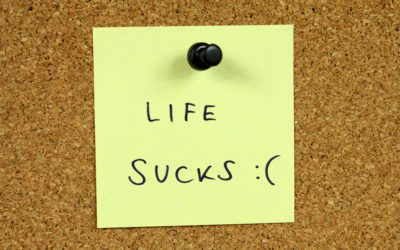I’ve always been fascinated by what human beings are capable of and why so few of us live up to that capability on a regular basis. In my TEDx talk, Why Aren’t We Awesomer?, I address that question by pointing out that the mind works more like a projector than a camera. When our thoughts are projected onto the screen of consciousness, we experience them through our senses as though they’re a real description of what’s happening instead of as an overlay through which we can occasionally glimpse a deeper reality.
In my books, I tend to sum up this particular ability of the mind to experience thought in the moment as real and for the body to experience stress, excitement, pressure, or a host of other emotions in response to that “reality” like this:
We’re living in the feeling of our thinking, not the feeling of the world.Click To Tweet
While most people seem to sort of kind of get the truth of that, one of the most common questions I get from clients and students is “If I understand that I’m living in the feeling of my thinking, why do I still feel bad?”
Which to me is a bit like saying “if I understand that gravity is true, why do I still fall down?”
Knowing how something works doesn’t stop it from working – it just makes it easier to work with it instead of against it. In this sense, the principles behind the human experience are a guide to reality, not a tool for self-improvement, feeling better, or doing better in your life.
The reason understanding the principles is so helpful in each of these areas is that we tend to automatically improve, feel better, and do better when we’re aligned with actual reality – the way things actually work.
When what we’re making up is out of line with reality, we struggle. When what we’re making up is aligned with reality, we thrive.Click To TweetHere’s how I write about it in Supercoach:
As a transformative coach, I begin with the premise that the starting-point for all life-enhancement projects is a deeper understanding of the nature of the human experience. People will naturally get more out of themselves when they understand more about who they are and how the human system works. They’ll automatically get more out of their lives when they gain more insight into how life works. Because when we really understand how something works, from a sliding door to a car to gravity, we don’t have to think about it anymore and can just get on with it. We slide, drive, and even fall to the ground with a sense of ease and simplicity.
In the same way, when we know who we really are and where our experience comes from, we don’t have to overthink things. We can live our lives and follow our guidance knowing that when we’re up, we’re up, when we’re down, we’re down, and love, peace, connection, and insight are available all the time, regardless of how we’re feeling.
In other words, if there’s something you want to create or do in the world, knowing how things actually get created and done is of universal benefit. All boats will rise with the tide of that deeper understanding.
When I reflect on the moments of insight which have really made a difference to me in my life, it’s inevitably those moments when the principles stopped seeming like interesting concepts to debate and started looking like a simple description of reality.
In the introduction to their biblical commentary Five Cities of Refuge, playwright David Mamet and Rabbi Lawrence Kushner point out that given a book as seemingly filled with contradictions as the Old Testament, you have two choices: You can presume that you are smarter than the book, or you can presume that the book is smarter than you. If the book were smarter than you, anything that doesn’t seem to make sense would not be a mistake in the book, but rather a blind spot in your understanding.
While I am far from a biblical scholar (I’m pretty sure that would require me to have read the book all the way through at least once), I recognize the same guideline at work in learning about the mind. When the world seems to work from outside to in – that is, when it seems as though something other than thought in the moment can create my experience – either that’s an exception to the principles or a blind spot in my understanding.
If it’s an exception, then “the principles” aren’t fundamental principles at all. If it’s a blind spot, then I can look again and see what else I can see. And it’s in this sense that seeing the principles as a guide to reality is so helpful. It allows me to drive any train of thought into the solid granite of the principles and see what’s real and what isn’t.
And as it says in A Course in Miracles:
“Nothing real can be threatened. Nothing unreal exists. Herein lies the peace of God.”
With all my love,
![]()





